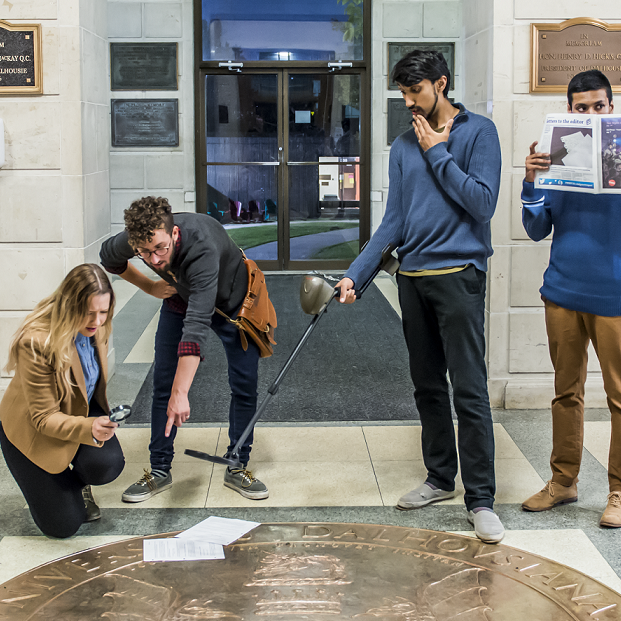
The case of the missing courses
More than two thousand courses that are no longer offered appear on Dal's newest course calendars
Potential Dalhousie students interested in checking out the university’s course offerings could be surprised to discover that over 2,000 courses listed in Dal’s academic calendars are not being offered this year.
Dalhousie has three academic calendars. A new calendar is produced by the registrar’s office every year for undergraduates, graduate studies and dentistry, law and medicine.
The calendars are available in print form as books, and online in PDF form and an interactive page on Dal.ca.
The page explaining academic calendars says Dalhousie’s “course calendar is your comprehensive reference to study at Dalhousie.” It says the calendars “list all of the 4,000 courses and 190 programs offered at Dal.”
New and potential Dal students are encouraged to read the calendars to see what courses they are interested in.
If you count every course listed in all three 2014/15 academic calendars, there are more than 5,800 course descriptions.
But if you look at the classes you may actually register for this year at Dalhousie, you would find just over 2,000 courses courses from the academic calendars are not present.
Those missing courses were offered sometime in the past – and there is no criteria for how long a course may remain on the academic calendar, year after year, after it has stopped being offered.
Old courses accepted for new calendars
Amarea Greenlaw, assistant registrar (registration and scheduling) at Dalhousie’s registrar’s office, says there is no criteria for how many years may pass with a course not being offered before it would be taken off the academic calendars.
Departments of the university independently send in their course lists to the registrar’s office where the calendars are assembled.
“The intention is that the calendar is sort of a catalogue of all courses that the university is either offering, or has offered or may offer,” says Greenlaw. “So it’s helpful for students who might need course descriptions for classes that they took several years ago that might not be offered now.”
Greenlaw says having access to course descriptions from prior years is useful if students need the descriptions for transfer credits to another institution, for employment or for graduate studies.
“We let departments put older courses in there without a timeline of when they need to be offered, so that students have access to that information,” says Greenlaw.
As this story is written, the page on Dal.ca that links to PDFs of every calendar back to the 2006/2007 academic year is inaccessible. A search of Archive.org shows these calendars were all easily accessible as recently as June.
Most departments listed in the academic calendars have notices that not all of their courses listed may be available for registration. Sometimes, this means more than half of all courses listed for that department are not actually available.
The undergraduate calendar has descriptions for 88 courses in the Classics department. Only 35 of these classes are available for registration this year.
Graduate students in architecture would have seen 80 courses listed in the 2014/15 calendar, but there are only 23 offered this year.
On the “Academic Support” page of Dal.ca, the page explaining Academic Calendars says the calendars “list all of the courses and programs offered at Dal, subject by subject.”
The academic calendars list all courses offered at Dal. A few courses like Topics in Real Analysis (MATH 3502) are offered this year while they cannot be found in the calendars. Some departments, like Business Administration in the graduate academic calendar, include notices that “additional electives may be added”.
“Keep in mind, some courses may not be offered every term,” the website goes on to say, “so make note of alternate courses you can take instead.”
4,000 courses, or 3,600?
Dal.ca’s claim that there are 4,000 courses at Dalhousie is echoed on the university’s new recruitment viewbooks, of which 60,000 copies have been printed according to Dal News.
(Another page on the Admissions section of Dal.ca gives a figure of 3,600 courses.)
If you count every course from the 2014/15 fall and winter semesters in the academic timetable, selecting to see courses held in all possible locations as well as courses held by distance education, there are just over 4,050 courses.
(This is if you count X/Y courses, courses which last two semesters, as one course.)
But approximately 762 courses are cross-listed across at least two departments. Courses are cross-listed when they are interdisciplinary and cross department boundaries, or when they can be taken as either undergraduate or graduate credits.
Some courses show up in the academic timetable as many as four times. The course Women and Aging, for example, may be registered for as GWST 3810, NURS 4370, NURS 5850 or SOSA 3245.
If every course that is cross-listed only crossed over just two departments, that would still mean the 762 courses would actually be 381 courses that can be registered for under different apartments.
That would take the figure of 4,051 down to 3,671.
But these are only the courses advertised in the academic timetable, and there are some courses that must be registered for through alternative means.
Some diploma programs at Dalhousie only have online courses, like the diploma offered in Emergency Health Services Management. The courses for these diplomas are not shown in the academic timetable, meaning even the academic timetable is not truly representative of all courses occurring in the 2014/15 year.
Staff in Dalhousie’s registrar’s office who gathered data for the viewbook had not responded to a request for comment by the time of publishing.
This story was originally published on Sept. 26, 2014 in issue 147-04 of the Gazette.







